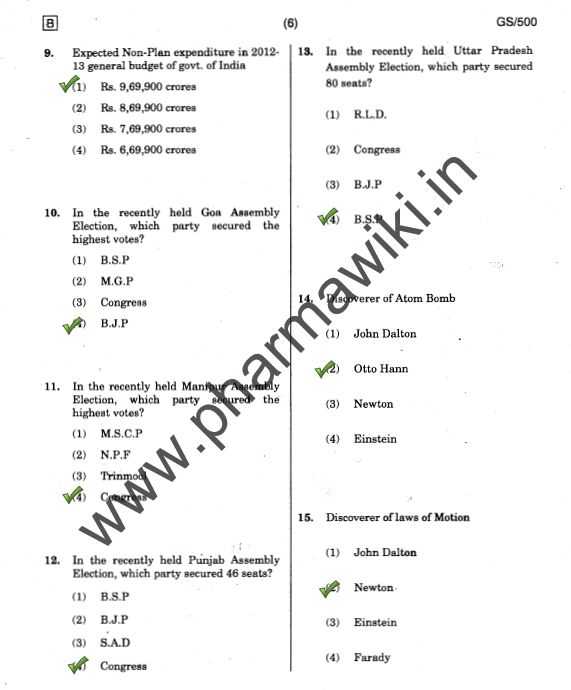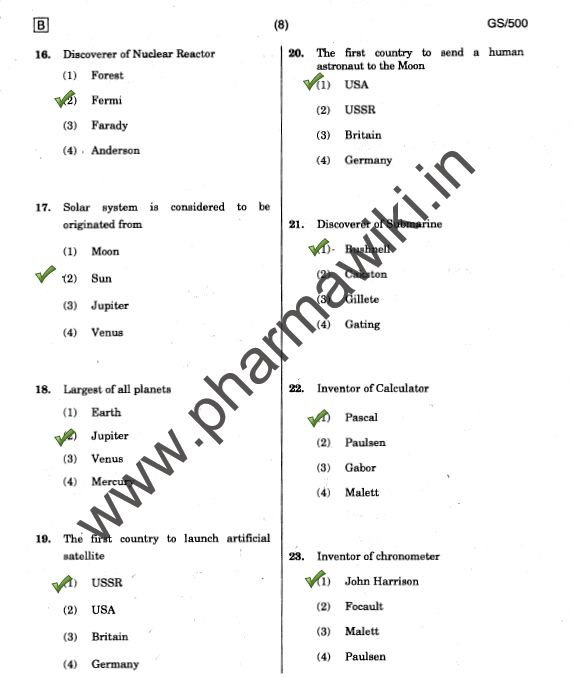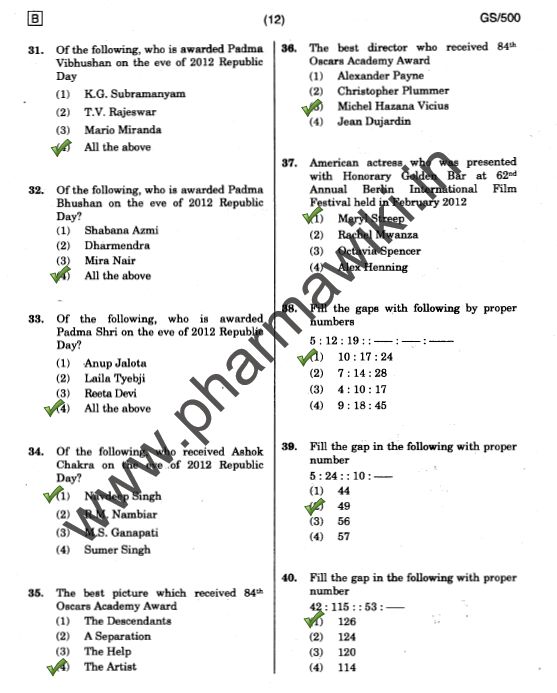| Re: Drug Inspector Exam Eligibility
Andhra Pradesh Public Service Commission conducts APPSC Drug Inspector Exam for recruitment to the posts of drug inspector in state government service. They are in charge of examination and quality control of various establishments producing drugs and medicines following national and international legal and medical standards.
Eligibility:-
Educational Qualification:-
One must possess Bachelor Degree in Pharmacy or Pharmaceutical Science or Medicine with specialization in Clinical Pharmacology or Microbiology from a reconised University established in India by Law.
Age Limit:-
Candidates between 18 and 36 years of age are eligible to apply.
Age Relaxation:-
For SC/ST and BC - 5 Years
Selection Procedure
The first round of selection is a Written Test. The next round is a Physical Fitness round. Before final selection one need to score well in viva voce as well.
The exact pattern and syllabus of the exam vary as per the authority which conducts the exam. The written test comprise of objective type questions. Multiple choices is given in most of the exams. There is negative marking for wrong answer. There are two papers. One paper is subject oriented and the other is based on general knowledge and general Science.
APPSC Drug Inspector Exam Paper Pattern:-
•General Studies & Mental Ability - 150 Marks - 150 Questions - 150 Minutes
•Subject (One Paper) - 300 Marks - 150 Questions - 150 Minutes Total:- 450 Marks
APPSC Drug Inspector Exam Syllabus:-
APPSC Drug Inspector Exam:-
Andhra Pradesh Public Service Commission conducts APPSC Drug Inspector Exam for recruitment to the posts of drug inspector in state government service. Candidates with a bachelors degree in pharmacy or medicine with specializaton in clinical pharmacology or microbiology are eligible to apply. The procedure of selection consists of written objective type exam that probes general ability and mental ability followed by subject specialization. Selected candidates are called for an interview.
Eligibility:-
Educational Qualification:- Must possess Bachelors Degree in Pharmacy or Pharmaceutical Science or Medicine with Specialization in Clinical Pharmacology or Microbiology from an University established in India by Law.
Age Limit:- Candidates who aged between 18 and 36 years of age are eligible to apply.
Age Relaxation:-
For SC/ST and BCs - 5 Years
Apply Online on website:- Candidates wishing to apply for APPSC Drug Inspector Exam are required to do so online on
APPSC Drug Inspector Exam Paper Pattern:-
•GENERAL STUDIES & MENTAL ABILITY - 150 Marks - 150 Questions - 150 Minutes
•SUBJECT (ONE PAPER) - 300 Marks - 150 Questions - 150 Minutes
Total:- 450 Marks
APPSC Drug Inspector Exam Syllabus:-
GENERAL STUDIES & MENTAL ABILITY
1. General Science – Contemporary developments in Science and Technology and their implications including matters of every day observation and experience, as may be expected of a well-educated person who has not made a special study of any scientific discipline.
2. Current events of national and international importance.
3. History of India – emphasis will be on broad general understanding of the subject in its social, economic, cultural and political aspects with a focus on Andhra Pradesh National Movement.
4. World Geography and Geography of India with a focus on AP.
5. Indian polity and Economy – including the country’s political system- rural development – Planning and economic reforms in India.
6. Mental ability – reasoning and inferences.
7. Disaster Management (Source : CBSE Publications) Concepts in disaster management and vulnerability profile of India / State of A.P.Earth quakes / Cyclones / Tsunami / Floods / Drought – causes and effects. Man made disasters - Prevention strategies. Mitigation strategies / Mitigation measures.
SUBJECT
1. Importance of various Pharmacopeas with special reference to Indian Pharmacopoes, British Pharmacopea, Unites States Pharmacopoea and International Pharmacopoes.
2. Sources of drugs: Plant, Animal, Mineral, Synthetic and Biotechnological drugs.
3. Preparation of Infusions, Decoctions, Tinctures, Solutions, Soft and Dry extracts. Introduction and classification of various pharmaceutical dosage forms.
4. Various parts of “Prescription” handling of pres criptions preliminary knowledge of importantLatin terms useful in interpretation of prescription and their translation into English.
5. Posology: Calculation of dosage for infants, children adults and elderly persons. Alcohol dilutions, Proof spirit, Isotonic solutions, Displa cement value.
6. Brief outline of communicable diseases, their causative agents, modes of transmission and their prevention (Chicken pox, Tuberculosis, Malari a, Filaria, Leprosy, Sexually transmitted diseases and AIDS).
7. First Aid: Emergency treatment of shock, snake-bites, burns, poisoning and fractures.
8. Classification of microbes their structure and identification. Bacterial growth, nutritional requirements and staining.
9. Contamination of pharmaceuticals in hospital and community environments by microbes.
10. Sterilization: Definition, types, procedure and testing.
11. Sterilization of materials, equipments and utencils used in hospitals, centralized and decentralised sterilization. Drug distribution system in hospitals for out-patients and in- patients.
12. Opthalmic preparations: formulations, methods o f preparation, containers and evaluation.
13. Collection, processing, storage and evaluation of blood, blood products and plasma – substitutes
14. Surgical products: Surgical cotton, surgical guazes, bandages, sutures, ligatures and catguts.
15. Definition and types of incompatibilities (Physical Chemical and Therapeutic), correction of incompatibilities.
16. Anatomy and physiology of Cardio-vascular system and related common disorders like hypertension, hypotension, angina, myocardial infarction and congestive heart failure.
17. Anatomy and physiology of Digestive system and related disorders like peptic ulcers,constipation, diarrhoea and jaundice.
18. Functions of different parts of Brain and spinal cord, Neuohumoral transmission in the central nervous system and autonomic nervous system.
19. Drugs, acting on cardiovascular system: Digital is and other cardiac glycosides, anti- hypertensive drugs, anti-anginal and vasodilators including calcium channel antagonists.
20. Drugs acting on Gastro-intestinal tract: antacids, anti-ulcer drugs, anti-emetics, laxatives and anti diarrhoeal drugs.
21. Drugs acting on central nervous systems: Sadati ves, hypnotics, anti-anxiety agents, centrally acting muscle relaxants, anti-epileptics, analgesic, anti-phyretic and anti-inflammatory drugs.
22. Antigens, anti-bodies, antigen-anti body reactions, hypersensitivity active and passive immunity types of vaccines.
23. Historical development of antibiotics. Isolati on of fermentation products with special reference to pencillins and tetracyclines.
24. Carbohydrate metabolism: Glycolysis, glucogenes is, glucogenolysis, glycogen formation, pentose phosphate pathway, uronic acid pathway, abn ormalities of carbohydrate metabolism.
25. Introduction and principles of anti-microbial t herapy Cotrimoxazole, fluorauinelones, newer pencillins, broad spectrum antibiotics, cephalospor ins, macrolides, anti-tubercular, anti-leprotic, antifungal and anti-viral drugs.
26. Anti protozoan and anthelmintic drugs. Chemith eraphy of neoplastic diseases.
27. Salient features of Drugs and Cosmetics Act, 1940 and Rules, 1945 with special reference to Duties and powers of Inspectors. Composition an d functions of statutory bodies.
28. Narcotic Drugs and Psychotropic substances Act, 1985 with special reference to procurement and utilization of dosage forms.
|





